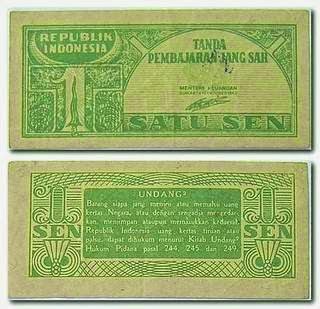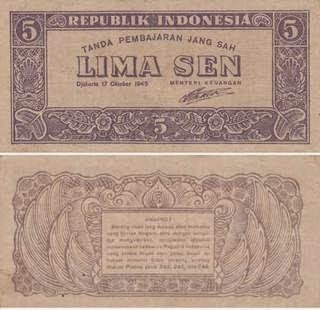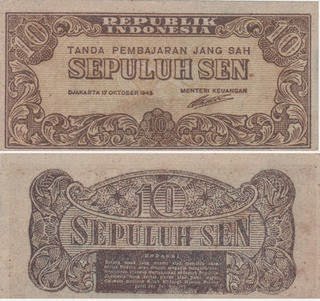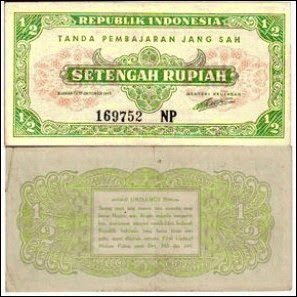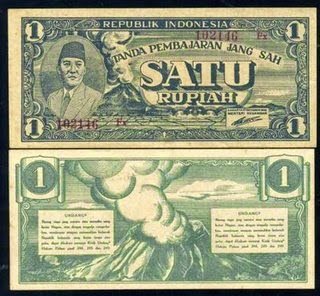Ancient Indonesia Money From Time To Time Up To The Latest
Speaking of Ancient Indonesian Money From Time to Time Until Newest course started from 1945. Because since that year the name of the Indonesian state officially stands. Although before 1945 in the archipelago (before the name of Indonesia) which was still composed of many kingdoms have been using coins, but the ancient money does not use the name of the rupiah currency.
The name of the rupiah itself was first used officially during the time of the Japanese occupation, Dai Nippon, in World War II. After the end of World War II, the Java Bank or better known as Javasche Bank issued the Rupiah currency. Javasche Bank is the forerunner of Bank Indonesia who print and circulate the rupiah as the currency of the state of Indonesia to date.
Ancient Indonesian Money Year 1945-1948 (period of ORI)
At that time many urged the Government to print its own currency. Until finally the government also issued ORI or Oeang Repoeblik Indonesia. But at that time state of the country still messed up ORI circulation a little choked up. Nevertheless the ORI remains circulated because it proves able to increase the solidarity and nationalism of the people of Indonesia.
The physical form of ORI was very simple. The quality is not good and the safety system in the form of fine fibers is still lacking. And in its periphery, ORI is divided into several publications.
ORI I (Year 1945)
Officially circulated on October 30, 1946.
The fractions consist of: 1 cent, 5 cents, 10 cents, ½ rupiah, Rp1,00, Rp5,00, Rp10,00, Rp100,00.
To know the sen and the rupiah, please read the Definition of money, history, and theory
ORI II (Year 1947)
Only four currency denominations: $ 5.00, Rp10.00, Rp25.00 and Rp100.00.
The Rp25.00 denomunity differs from the other three par.
For this edition, all currencies are dated Djokjakarta 1 January 1947.
Signed by Mr. Sjafruddin Prawiranegara.
ORI III (Year 1947)
Consists of seven types of fractions, ie from ½ rupiah to Rp250, 00.
In this era there is a rare fraction of the series 100 rupiah Maramis.
This fraction can only be defeated by the 600 rupiah denomination in the ORI IV series.
ORI IV (Year 1948)
This series has a very peculiar parent denomination, which is Rp0,00, Rp75,00, Rp100,00 Hatta, Rp400,00, and one of the best and rarest works, as well as the most expensive price, nominal 600 rupiah (unissued).
Old Indonesia Money In The New Order.
First published money: Series "Sudirman"
Consists of fractions: Rp1,00, Rp2½, 00, Rp5,00, Rp10,00, Rp25,00, Rp50,00, Rp100,00, Rp500,00, Rp1,000,00, Rp5,000,00 and Rp10 $ 0.00.
Ditandatangaini by the Governor of Bank Indonesia Radius Prawiro and Director of BI Soeksmono B Martokoesoemo.
Year Emission: 1968
Starting circulated: January 8, 1968
Dated August 23, 1971 devalued the rupiah by 10%, the rupiah against the US dollar Rp415, 00 (formerly Rp378, 00).
Year 1975 out of new banknotes again with nominal:
Rp1.000,00 with Pangeran Diponegoro
Rp5.000,00 with pictures of Fishermen
Rp10.000,00 illustrated Relief of Borobudur Temple (each signed by BI Governor Rachmat Saleh and Director of BI Soeksmono B Martokoesoemo)
Please read How to write correct rupiah according to EYD
Year 1992 issued another new banknotes with nominal:
Rp100,00 with Phinisi Boat image
Rp500,00 with Orangutan image
Rp1.000,00 with pictures of Lake Toba
Rp5.000,00 with picture of Sasando Musical Instrument
Rp10.000,00 with picture of Sri Sultan Hamengku Buwono IX
Rp20.000 with red Cendrawasih image
In 1993 BI again issued new money again with nominal:
Rp50.000,00 with the picture of President Soeharto
In 1993 issued more fractions
Rp50.000,00 with the picture of President Soeharto
Issues are also issued with the same fractions and drawings but are made of polymer palstic material with a "holographic" safety of Soeharto, not a watermark, as is commonly used.
Pictures of Indonesian Money From Until Now
From the above description, the money used in our country is changing his physical form. And here's a picture of old Indonesian paper money to the latest
